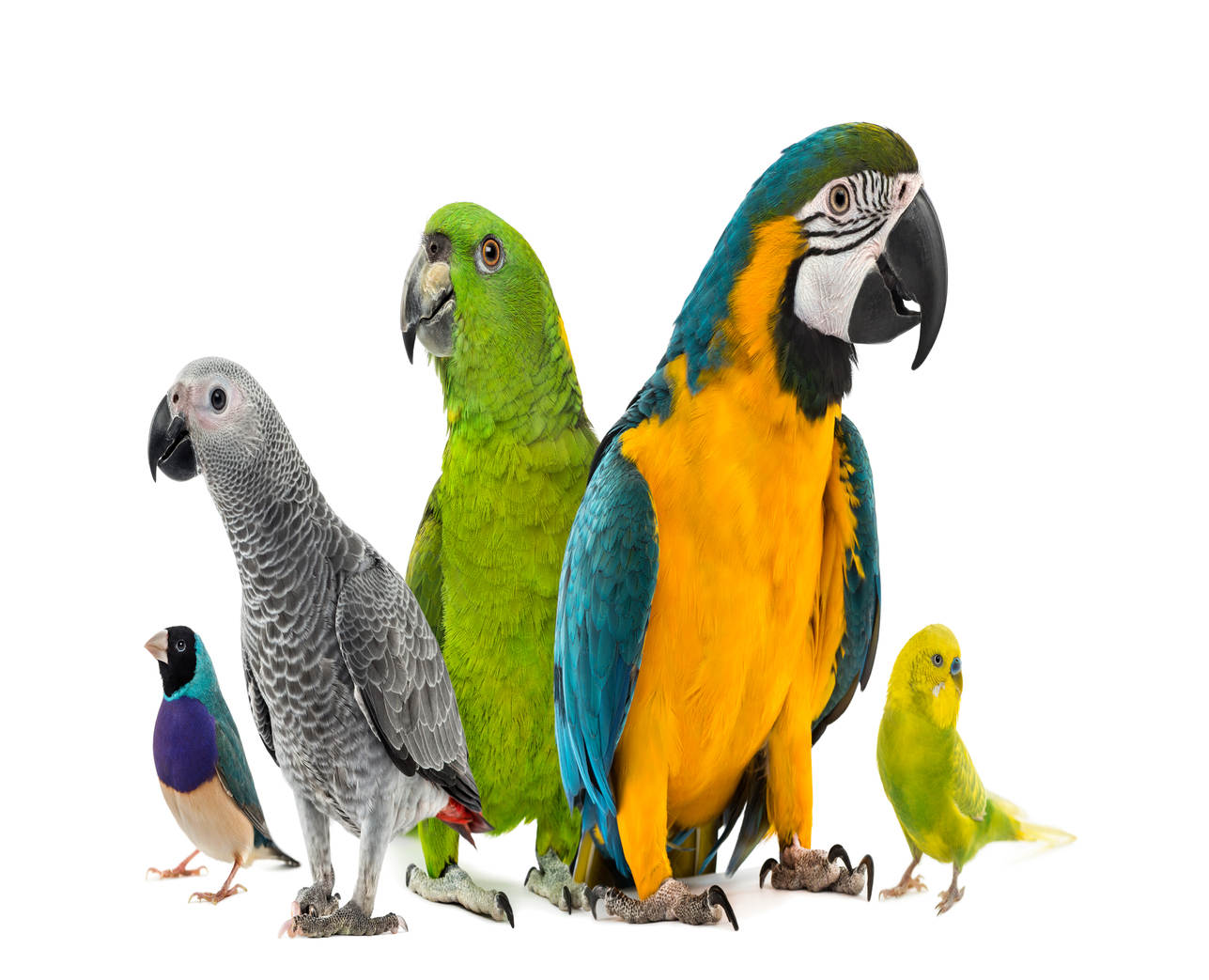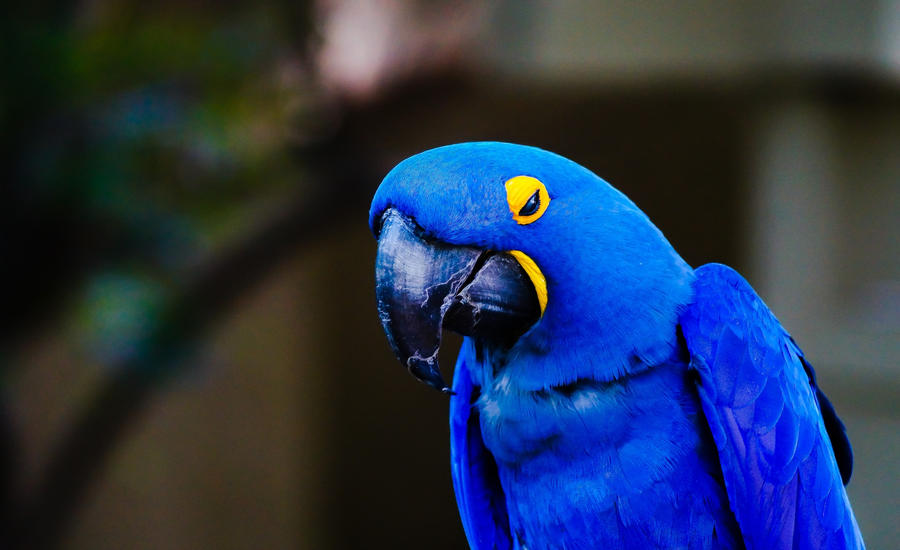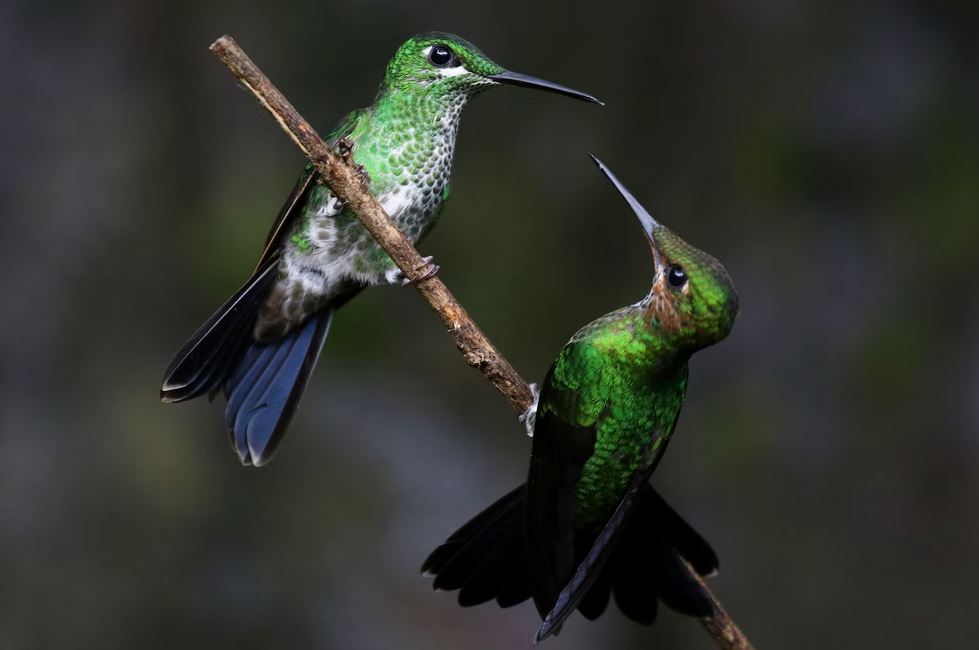Top 10 Best Pet Birds: From Parakeets to Cockatiels, Know Their Unique Personalities
Welcome to the fascinating world of pet birds! Whether you’re a first-time bird owner or an experienced avian enthusiast, finding the perfect feathered friend might seem like a daunting task with so many species to choose from.
In this blog post, we have carefully compiled a list of the top 10 best pet birds suited for various lifestyles and preferences, considering factors such as size, noise level, intelligence, lifespan, and care requirements.
From lovable Budgies to majestic Macaws and everything in between – let’s embark on this journey together and help you find your ideal winged companion that will bring joy and companionship into your home.
Key Takeaways
- When choosing a pet bird, important factors to consider include size and space requirements, noise level, intelligence and trainability, lifespan, temperament and personality, as well as diet and care needs.
- The top 10 best pet birds for your home include African grey parrots (intelligent but require dedication), budgerigars (low-maintenance but sociable), cockatiels (affectionate but high-energy), conures (outgoing with diverse personalities) and other species that have unique characteristics suited for different types of bird owners.
- Providing proper care including a balanced diet, regular grooming practices like wing clipping and veterinary check-ups can help ensure the optimal health of your feathered companion.
- Ultimately careful research is crucial before adopting or purchasing any pet bird to ensure an ideal environment where both you and your avian companion can thrive together.
6 Important Factors To Consider When Choosing A Pet Bird
Carefully consider these important factors before finally deciding on a pet bird, whether it’s for you, a loved one or as a gift to a friend:
- Size and space requirements
- Noise level
- Intelligence and trainability
- Lifespan
- Temperament and personality
- Diet and care needs
1. Size and Space Requirements
Selecting the right pet bird for your home involves considering size and space requirements, ensuring that you can provide a comfortable habitat for your new feathered friend.
The shape of the cage plays a significant role in your pet’s well-being, with rectangular or square habitats being preferable to round ones. Evenly spaced bars on the cage are necessary to allow the bird adequate room to move freely without injury or escape.
For example, choosing a Canary requires less space than an Amazon parrot, which could be helpful when deciding which pet bird from the top 10 best pet birds for beginners suits your living situation best.
2. Noise Level
Noise level is a critical factor to consider when selecting the perfect pet bird for your home, particularly if you reside in an apartment or shared living situation.
Some species, such as macaws and cockatoos, are known for their boisterous vocals and may not be well-suited for those with close neighbors.
However, potential bird owners must also bear in mind that even generally quiet species may have their moments of noise-making. For example, lovebirds tend to communicate using chirps and peeps making them suitable as low-noise companions; but they can emit shrill calls during periods of excitement.
It’s crucial to research various pet bird species’ vocalizations before committing to ensure harmony among all household members – both feathered and otherwise.
3. Intelligence and Trainability
Intelligence and trainability are crucial factors to consider when searching for the perfect pet bird. In general, parrots are known as some of the most intelligent birds, which makes them highly trainable creatures.
African Grey Parrots, for example, are widely recognized for their impressive cognitive abilities and adeptness in mimicking speech.
A bird’s intelligence level can impact its ability to bond with its owner and adapt to new environments or situations. Beginner bird owners may prefer friendly pet birds like Budgies (Budgerigars) or Cockatiels due to their relative ease of training compared to larger parrot species such as Macaws.
These smaller avian friends also come with big personalities wrapped up in a more manageable package, making them an excellent choice for first-time enthusiasts taking on the rewarding challenge of training their feathered companions.
4. Lifespan
Pet bird lifespans vary greatly depending on the species. Smaller birds, like canaries and parakeets, generally live up to 10 years, while larger parrots, such as macaws and cockatoos, can live up to 50 years or more in captivity! It’s important to keep this in mind when choosing a pet bird because they require long-term commitment and care.
For example, African Grey Parrots have one of the longest lifespans among pet birds with an average lifespan of 40-60 years. This makes them a great choice for experienced bird owners who are looking for a companion that will be with them for a very long time.
On the other hand, if you’re new to owning birds and want something shorter term, budgerigars (budgies) make wonderful pets and typically live between six to eight years on average.
5. Temperament and Personality
The temperament and personality of a pet bird are essential factors to consider when choosing the right bird for your home. Some birds are social and affectionate, while others are more independent and reserved.
On the other hand, Lovebirds are small but full of personality, often forming strong bonds with their owners.
It’s crucial to choose a pet bird whose personality matches your lifestyle and expectations. If you want an affectionate bird that will cuddle up on your lap while watching TV or reading a book, then a Cockatiel or Budgie may be perfect for you.
However, if you prefer a more independent bird that doesn’t require constant attention, then Finch or Dove could be ideal choices.
6. Diet and Care Needs
A balanced and nutritious diet is essential for the overall health and well-being of pet birds. While seeds, nuts, and fruits can be a part of their diet, it should not be the only source of nutrition.
Pelleted diets designed for specific species provide all the necessary vitamins, minerals, and nutrients that birds need to thrive.
It’s also crucial to monitor your bird’s water intake carefully as dehydration can lead to severe health problems. Birds require clean freshwater daily in bowls or bottles that are easy to access but cannot be easily tipped over or fouled with food debris.
Besides healthy eating habits, regular grooming practices like wing clipping (a procedure involving trimming feathers on one or both wings) may also help prevent injury and promote good hygiene in pet birds.
Top 10 Best Pet Birds For Your Home
Discover the top 10 best pet birds for your home, including African grey parrots, budgies, cockatiels, conures, and more.
1. African Grey Parrots
 African Grey Parrots are one of the most popular pet bird species and for good reason! These birds are known to be incredibly intelligent, able to learn a vast vocabulary and mimic sounds from their surroundings.
African Grey Parrots are one of the most popular pet bird species and for good reason! These birds are known to be incredibly intelligent, able to learn a vast vocabulary and mimic sounds from their surroundings.
They have a sociable nature and require plenty of mental stimulation in order to stay happy and healthy.
According to Tracy Vets, African Grey Parrots rank among the top 10 best types of pet birds for your home. With their intelligence and playful personalities, they can provide endless entertainment for bird owners.
2. Budgerigars (Budgies)
 Budgerigars, also known as budgies or parakeets, are one of the most popular pet birds around due to their small size and low-maintenance needs.
Budgerigars, also known as budgies or parakeets, are one of the most popular pet birds around due to their small size and low-maintenance needs.
These little birds are native to Australia and come in a variety of colors, making them an attractive addition to any home.
Budgies are incredibly intelligent and sociable birds that enjoy interacting with their owners. They can learn to whistle tunes or even speak basic phrases with proper training and socialization.
Additionally, they require minimal grooming needs but do need a healthy diet consisting of seeds, fruits, vegetables, and water.
3. Cockatiels
 Cockatiels are a popular choice for families looking for a friendly and affectionate pet bird. Known for their playful nature, cockatiels love spending time with their owners, enjoying cuddles and head-scratches.
Cockatiels are a popular choice for families looking for a friendly and affectionate pet bird. Known for their playful nature, cockatiels love spending time with their owners, enjoying cuddles and head-scratches.
As one of the top 10 best pet birds, cockatiels can live up to 25 years when given proper care and attention. They are high-energy birds that require regular exercise and stimulation in the form of toys and enrichment activities.
Cockatiel owners should also provide them with a healthy diet, regular grooming, and veterinary check-ups to ensure optimal health throughout their lifespan.
4. Conures
 Out of the many species of pet birds available, Conures are among the most popular. These birds are either large parakeets or small parrots and share similarities with Australian parakeets in terms of appearance.
Out of the many species of pet birds available, Conures are among the most popular. These birds are either large parakeets or small parrots and share similarities with Australian parakeets in terms of appearance.
Green-Cheeked Conures are one type of Conure that thrives on spending time socializing with their caretakers. They enjoy being around people and have a gentle disposition that makes them great companions.
In addition to their friendly nature, Janday Conures are another popular variety that make excellent pets due to their sweet demeanor and affectionate personalities.
5. Eclectus Parrots
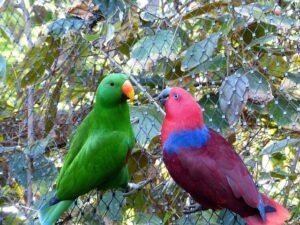 Eclectus parrots are a popular choice among bird owners and for good reason. They are known for their stunningly bright colors, friendly personalities, and above all else, their ability to talk.
Eclectus parrots are a popular choice among bird owners and for good reason. They are known for their stunningly bright colors, friendly personalities, and above all else, their ability to talk.
As one of the top 10 best pet birds for your home, Eclectus parrots make loyal companions that can bond deeply with their owners.
Belonging to the genus of parrot species called Eclectus consisting of four known extant species, these beautiful birds are often sold as pets and can be found for sale online.
6. Lovebirds
 Lovebirds are a popular choice among pet bird owners and one of the best pet birds for your home. They are known for their affectionate and friendly personalities, making them great companion birds.
Lovebirds are a popular choice among pet bird owners and one of the best pet birds for your home. They are known for their affectionate and friendly personalities, making them great companion birds.
Lovebirds are also monogamous and mate for life, forming strong bonds with their partners.
There are multiple species of lovebirds that make great pets, including the masked lovebird, black-cheeked lovebird, and Fischer’s lovebird. These small birds have primarily green feathers with orange upper bodies and heads, light blue lower backs and rumps, red beaks, and white eyerings.
7. Macaws
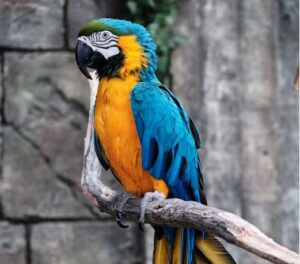 Macaws are the largest species of parrots in the world and are known for their vibrant plumage and friendly, extroverted personality. Blue and gold macaws, in particular, make popular pets due to their stunning beauty and playful nature.
Macaws are the largest species of parrots in the world and are known for their vibrant plumage and friendly, extroverted personality. Blue and gold macaws, in particular, make popular pets due to their stunning beauty and playful nature.
Keeping macaws as pets requires owners to provide them with adequate space for exercise and playtime, as well as a healthy diet rich in fruits, vegetables, nuts, seeds, and pellets.
They also thrive on mental stimulation through toys and interaction with their caretakers.
8. Parakeets
 Parakeets, also known as budgies, are the most popular pet bird species in the world. They are small and easy to care for, making them a great choice for beginner bird owners.
Parakeets, also known as budgies, are the most popular pet bird species in the world. They are small and easy to care for, making them a great choice for beginner bird owners.
Parakeets are intelligent and social creatures that thrive when given enough attention and interaction from their owners. What sets parakeets apart from other pet birds is their ability to talk.
In addition to being great talkers, parakeets have several other appealing traits. They are flock birds by nature which means they enjoy having a companion or living with other parakeets.
Their cere above their beak reveals their gender which makes it easier for breeders who want to avoid accidental breeding between male and female parakeet pairs.
9. Quaker Parrots
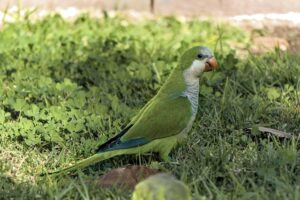 Quaker parrots are one of the best pet bird species for families due to their friendly and affectionate nature. They have a unique combination of intelligence, determination, and attitude that makes them a joy to be around.
Quaker parrots are one of the best pet bird species for families due to their friendly and affectionate nature. They have a unique combination of intelligence, determination, and attitude that makes them a joy to be around.
These medium-sized birds measure 11 to 13 inches in length and weigh an average of 3-5 ounces. Quaker parrots enjoy playing with toys, mimicking sounds, and interacting with people.
They form strong bonds with their owners and love being part of family activities.
10. Canary
 Canaries are a popular pet bird species that are native to the Canary Islands. They are known for their beautiful singing, especially the males, and make great pets for those who enjoy a cheerful and friendly demeanor.
Canaries are a popular pet bird species that are native to the Canary Islands. They are known for their beautiful singing, especially the males, and make great pets for those who enjoy a cheerful and friendly demeanor.
Canaries are featured on multiple lists of top pet birds, including the top 10 best pet birds for your home and the top 10 most popular pet birds in the world. As one of the best types of pet birds for beginners, canaries can be a wonderful addition to any family.
Characteristics And Care Needs Of Each Pet Bird
Each pet bird has unique characteristics and care needs that must be considered before making a decision to bring one home. It’s important to research the specific bird species thoroughly to understand their:
- Lifespan
- Diet and nutrition requirements
- Exercise and enrichment needs
- Grooming and health care necessities
- Socialization and training requirements.
1. Lifespan
Lifespan is a crucial factor to consider when choosing a pet bird, as different species have varying lifespans that can range from a few years to several decades. Taking note of a bird’s average lifespan can help you determine if you are prepared to commit to their long-term care and ensure a happy and healthy life for your pet. The table below provides an overview of the lifespans of the top 10 best pet birds:
2. Diet and Nutrition
A well-balanced diet is critical to ensure the overall health and well-being of your pet bird. Here’s an overview of the dietary requirements for some popular pet bird species:
Remember that water is the most crucial nutrient for pet birds, as emphasized in the CIR1082/VM067 article. Fresh fruits and vegetables should not exceed 15-30% of the bird’s diet but can be valuable sources of carbohydrates, vitamins, and minerals. Healthy and well-socialized birds, such as Parakeets, make for the best pets, as suggested in the Tracy Vets article.
3. Exercise and Enrichment
Exercise and enrichment are essential components of a pet bird’s life, as they contribute significantly to their overall well-being and happiness. Different species of birds have distinct exercise and enrichment needs, so it’s important to understand and meet these requirements.
Providing various options in their living environment, such as toys, perches, climbing structures, and opportunities for flight, can help birds develop preferences and expose them to diverse experiences. Below is a table highlighting exercise and enrichment ideas for the top 10 best pet bird species mentioned in this article.
4. Grooming and Health Care
Proper grooming and health care are crucial for the well-being of pet birds. Regular maintenance includes trimming their nails, beaks, and wings to prevent injury or accidents. A healthy bird should have bright, gleaming eyes, shiny feathers with no bald or sparse patches, and clean feet. Any changes in a bird’s appearance should prompt an immediate veterinary check-up.
In addition to regular grooming, birds require a balanced diet that meets their specific nutritional needs. Food dishes must be cleaned daily to avoid bacterial growth which can lead to illness. Providing fresh water is also important for keeping your feathered friend healthy and hydrated.
Providing adequate exercise opportunities through playtime outside of the cage helps improve circulation and keeps them active. Taking such simple measures in maintaining proper hygiene greatly contributes towards ensuring that our pet birds remain healthy at all times.
Taking these steps can help keep your bird stay happy and healthy for years to come!
Pros And Cons Of Owning A Pet Bird
Owning a pet bird can be a rewarding and entertaining experience, but it also comes with its own set of challenges. From the companionship and low-maintenance to the potential health issues and messy habits, there are several pros and cons to consider before bringing a feathered friend into your home.
Pros: Companionship, Low-Maintenance, Entertaining
Birds make wonderful pets for many reasons. Here are some of the top pros to owning a pet bird:
- Companionship: Birds are social creatures and can form strong bonds with their owners. They love to interact and play, and many species enjoy cuddling and being petted.
- Low-maintenance: Compared to other pets, birds require minimal grooming and don’t need to be taken outside for walks or potty breaks. Many species can entertain themselves with toys and enrichment activities, so they don’t need constant attention from their owners.
- Entertaining: Birds are highly intelligent animals that love to show off their skills and learn new tricks. Many species also have unique personalities that make them fun to watch and interact with.
Overall, owning a pet bird can bring joy, entertainment, and companionship into your life with relatively little effort on your part. Just be sure to research the specific needs of your chosen bird species so that you can provide them with the best possible care.
Cons: Screaming, Messy, Potential Health Issues
While there are many benefits to owning a pet bird, it’s important to consider the potential downsides before making a decision. Here are some of the cons to be aware of:
- Screaming: Some bird species are known for their loud, constant squawking. This can be disruptive to your household and may even irritate your neighbors.
- Messy: Birds can create a lot of debris from shedding feathers, food and water spills, and droppings. Regular cleaning is necessary to maintain hygiene and prevent unpleasant odors.
- Potential health issues: Birds can be susceptible to a range of health problems, which can be costly to treat. Without proper care, birds may be at risk for respiratory infections, feather plucking, or other issues that impact their well-being.
It’s important to keep these factors in mind when considering whether a pet bird is right for you. While they can make loving and entertaining companions, they do require commitment and specialized care to thrive.
Expert Tips For Caring For Your Pet Bird
– Provide a healthy and balanced diet that includes fresh fruits, vegetables, seeds, and pellets.
– Offer proper toys and enrichment to keep your bird mentally stimulated and physically active.
– Maintain cleanliness and hygiene in the bird’s cage or living area by cleaning it regularly.
– Take your pet bird for regular veterinary check-ups to ensure their health is in good condition.
– Socialize and train your pet bird to prevent behavioral problems such as biting or screaming.
– Research extensively about the specific species of pet bird you want to own before making a decision on which one to get.
1. Providing a Healthy Diet
A healthy and balanced diet is essential for the well-being of your pet bird. Birds require a diverse range of nutrients to maintain their health, including proteins, fats, carbohydrates, vitamins, and minerals.
As a responsible pet owner, you should provide your feathered friend with a formulated pellet diet that includes all the necessary nutrients they need daily.
To ensure optimal nutrition for your pet bird, supplement their diet with fresh fruits and vegetables like carrots or sweet potatoes containing beta carotene and vitamin A crucial for feathers’ development or leafy greens rich in calcium needed for strong bones.
2. Offering Proper Toys and Enrichment
Birds are intelligent and curious creatures that require stimulation for their mental and physical well-being. Providing proper toys and enrichment is crucial to keeping pet birds healthy, happy, and entertained.
Pet bird toys come in various forms such as swings, ladders, balls, mirrors, puzzles, and chew toys.
Over time pet birds can become bored with their existing toys; therefore it’s important to introduce new ones or switch-up the environment by changing placement or adding new perches.
Additionally providing fresh branches from non-toxic trees enables birds to explore natural textures while keeping them engaged physically through climbing activities.
3. Maintaining Cleanliness and Hygiene
Regular cleaning and maintenance of your pet bird’s living space is crucial to reduce the risk of infections. For a healthy environment, deep clean the cage at least once a week and spot clean daily to remove droppings, leftover food, or any feathers.
Ensure that the water dish is refilled with fresh water regularly to prevent bacteria from growing in stagnant water.
Keeping your bird clean is just as important as keeping its environment clean; this includes regular misting sessions with clean water to keep their feathers tidy, nail clipping, and beak care.
Dirty beaks can become breeding grounds for bacteria which are easily transmitted throughout the bird’s body during feeding times.
4. Regular Veterinary Check-Ups and Grooming
Regular veterinary check-ups and grooming are essential for the health and well-being of pet birds. Birds are experts at hiding signs of illness, and routine visits to a board-certified avian veterinarian can help detect any potential health issues early on, before they become severe.
Grooming is equally important in caring for pet birds. Regular misting with clean water helps keep feathers healthy and shiny. Be sure to replace dirty or frayed rope perches as needed since birds’ feet can get caught in them and cause injury.
Wing clipping is also an essential part of grooming for many pet birds; it helps prevent injuries from flying into windows and walls while ensuring safe indoor flight capabilities.
5. Providing Adequate Socialization and Training
Socialization and training are crucial for the well-being of pet birds. Birds that are not adequately socialized can become aggressive, shy away from human interaction or develop anxiety issues.
Thus, it is essential to start socializing your bird from an early age by offering ample opportunities for playing, bonding with their owners, and exploring new environments.
Proper training can make all the difference when it comes to your bird’s behavior, communication skills, and overall happiness.
For example, teaching your bird how to step up onto your hand on command not only helps bonding but also makes it easier to manage your bird’s routine care needs such as cleaning their cage or trimming their nails.
6. Research the Bird Species Thoroughly
It is crucial to do thorough research before selecting a pet bird species, as different birds have unique personalities, care requirements, and lifespans.
Researching the breed will ensure that you select a bird that suits your lifestyle and meets your expectations for a pet companion.
For example, African Grey Parrots are highly intelligent but require significant socialization and interaction with their owners. On the other hand, Lovebirds are affectionate little birds that bond strongly with their owners but may be noisy or destructive without proper care.
7. Meet and Interact With the Birds Before Making a Decision
It is important to spend some time interacting with the birds before deciding which one to bring home as a pet. This can help you gauge their personality, temperament, and behavior, allowing you to make an informed decision.
For example, some bird species may require more attention and socialization than others while others may be more independent. Meeting and interacting with the birds also allows them to get accustomed to your presence and gives them a chance to bond with you before bringing them home.
Conclusion – Best Pet Birds
In conclusion, choosing the best pet bird for your home requires careful consideration of important factors such as size, noise level, personality and diet needs.
The top 10 best pet birds include a range of species from African grey parrots to canaries. Each bird has unique characteristics that make it an ideal companion for different types of bird owners.
FAQs on Best Pet Birds
1. What are the best pet birds for beginners?
There are many great pet birds for beginners, but some of the best include budgies, parakeets, and cockatiels. These birds are relatively small and easy to care for, and they are known for being friendly and affectionate. They are also relatively quiet, which makes them a good choice for people who live in apartments or other close quarters.
2. What are some of the most popular pet birds?
Some of the most popular pet birds include parrots, macaws, cockatoos, and finches. Parrots are known for their intelligence and ability to learn to talk, while macaws are known for their large size and beautiful plumage. Cockatoos are known for their playful personalities, while finches are known for their chirping songs.
3. How much do pet birds cost?
The cost of a pet bird can vary depending on the type of bird, its age, and its health. However, in general, pet birds can cost anywhere from $50 to $1,000. The cost of food, toys, and other supplies will also need to be factored in.
4. How much time do pet birds need?
Pet birds need a lot of attention and interaction. They should be allowed out of their cages for at least a few hours each day to fly, play, and socialize. It is also important to provide them with plenty of toys and other enrichment activities to keep them occupied.
5. What are some of the challenges of owning a pet bird?
Some of the challenges of owning a pet bird include:
- Noise: Some birds can be quite noisy, which can be a problem if you live in an apartment or other close quarters.
- Mess: Birds can make a mess, especially when they are eating or drinking.
- Training: Some birds can be difficult to train, especially if they are not socialized at a young age.
- Health: Birds can be susceptible to a variety of health problems, which can be expensive to treat.
6. What are some of the benefits of owning a pet bird?
Some of the benefits of owning a pet bird include:
- Companionship: Birds can provide companionship and love.
- Intelligence: Birds are intelligent creatures that can learn tricks and interact with their owners in a variety of ways.
- Entertainment: Birds can provide hours of entertainment with their singing, talking, and playful antics.
- Education: Birds can teach children about nature and responsibility.
If you are considering getting a pet bird, it is important to do your research and choose a bird that is right for you. Be sure to factor in the cost of care, the amount of time you have to spend with your bird, and the challenges that come with owning a bird. With proper care and attention, a pet bird can be a loving and rewarding companion for many years to come.
editor's pick
latest video
news via inbox
Nulla turp dis cursus. Integer liberos euismod pretium faucibua

